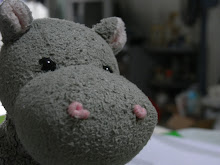I feel heartened every time I read or hear about people doing their bit for nature. It's great that ordinary folk spend time educating the public and channelling their energies into conservation work. Then there are those who don't care and these people really get my goat.
After Pedal Ubin, we were in high spirits as we headed toward the jetty to take a bumboat back to the mainland. As it was low tide, the mudflats were exposed and we spent some time looking down for signs of life from our position on the walkway. Walking slightly ahead, I suddenly stopped short at the sight of people crouching down on the mudflats. Okay, no reason to get alarmed yet. When I got closer, the sight that lay before my eyes (and for anyone who bothered to look) confirmed my earlier suspicion.
A group of five (a mix of both males and females), with at least one wielding a long stick and a plastic bag, were nonchalantly trampling on the mudflats and destroying the burrows made by the crabs. Destroying the mudflats by trampling? Hardly. With their long stick, they proceeded to insert the end into burrow after burrow. As they pulled the stick back up each time, a lot of mud was dislodged intentionally. Disgruntled that no crabs were getting caught, they repeated the process again. One of them even took out his camera to take his friends in action.
The above happened in a matter of seconds, and by that time, the others (some guides and participants who were heading back to Changi Village) had gathered and they started calling verbal deterrents to the group below. Mindy and I informed the NParks guy at the information kiosk, who grudgingly roused himself from his nap to entertain us. As we told him what we saw, he pointed to the map of Pulau Ubin laid out and said that only Chek Jawa is a restricted zone..here we (meaning NParks) have no power..can only stop them if they're damaging or killing things (I specifically remember him giving seahorses as an example). In short, he made it sound as if people are free to do what they like in the areas that are not protected.
Clearly those people were causing damage!
We finally got him to follow us after some time (didn't seem willing to leave his post), but by then, we only saw the backs of the intrepid hunters who had finally decided to leave.
Okay, so NParks has no power to stop people from damaging areas that are not protected. Seems reasonable enough, for not ALL areas can be protected. What if endangered animals happen to live on shores/in areas that have no protection? Can poachers poach all they want?
Where do we draw the line?
The NParks staff have the option of telling people to cease their detrimental activities, but otherwise, nothing else can be done. I just called the NParks management office to ask for their take on this matter. Much of what was told to me I already heard from his fellow colleague, except that he put it across in a much nicer way. Something new to me was that the area in question falls under the jurisdiction of the LTA and even HSBC.
I asked the guy what NParks is doing about areas with no protection. His answer was that they are trying to get something done but there are politics involved. Not that word again, please.
What can we do to help?
The matter with red-tape aside, I can see why education is imperative in spreading the message of conservation. Ignorance can be attributed to the harm humans inflict and this can be reduced through education. Don't wait around for authorities to implement some policy or kick off some campaign to 'save the Earth'. It can start on the individual level, if you let it.
Did you ever collect sea shells when you were a kid? For many people, myself included, I thought that it was a harmless activity. On the day that I found out shell collection had negative effects (depriving hermit crabs of their homes, etc), I opened my mouth to start a reply but closed it when I realised that all I had to say started with either "I didn't know" or "I didn't think".
Tuesday, March 10, 2009
Subscribe to:
Post Comments (Atom)



Very nice blog entry... thought provoking and bring us closer in understanding the reality of conservation in Sinagapore. More can be done individually and by the relevant authorities.
ReplyDeleteThanks:) There's the mindset that one can't make much of a difference, but I feel that's wrong. If one starts, and then another, you'll end up having a lot. And I'm sure that counts for something.
ReplyDeleteHey! :) Did you and your friends consider approaching the people who were doing wrong and letting them know that they were doing something bad (i.e. educate them)?
ReplyDeleteI think that takes a lot of courage but if we do it with wisdom and sensitivity, understanding that we were once ignorant as to how to care for the environment too, the effect might be manifold.
Who knows, one day, one of them might through this experience, become a lover and advocator of nature as well!
Hi:)
ReplyDeleteAdmittedly, right there and then, the thought of educating them did not cross my mind. I'm not sure as to how the others felt. For me, I felt that it was really important to stop them, first and foremost, so that further damage could be prevented. Calling verbal deterrents did not seem to sway them, so I was prompted into getting the authorities involved.
I agree with what you said though - that ignorance can be lifted through education. Indeed, education is the tool that should be used more frequently...
Thanks for your comment :)